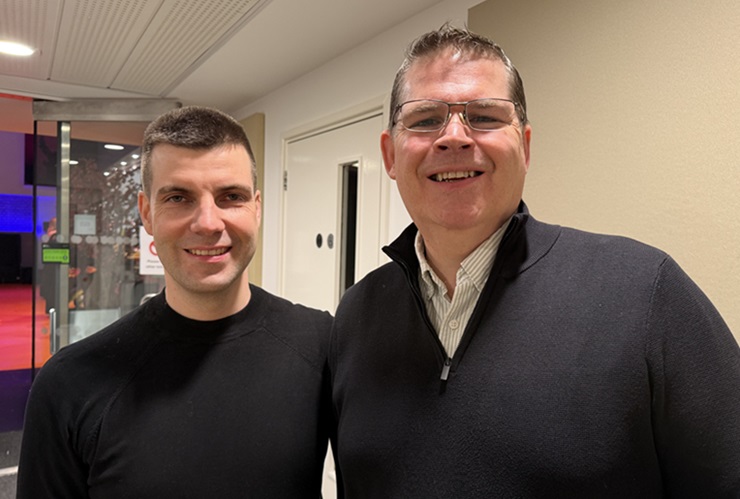
Conductor: Michael Fowles
Soloist: Tim de Maeseneer
2025 RNCM International Brass Band Festival
RNCM Manchester
Friday 24th January

Creative forces of myth, nature and exploration were brought together for this fine opening concert of the RNCM International Brass Band Festival.
A connective thread linked a trio of imposing compositions to create a fascinating first half of exhilarating musical purpose – opening with Paul Mealor’s absorbing fantasia deconstruction of the Rondeau from Purcell’s ‘Abdelazer Suite’.
Originally written for the 2016 National Youth Brass Band of Wales, it was aided by Michael Fowles’ careful unveiling of the layers of its deceptive elegance; stripping bare the ornate filigree to reveal the building blocks of Purcell’s genius and Abdelazer’s revengeful psyche – the darker currents of the music swirling underneath the masked exterior. Only at its conclusion were the subtle deviations, thematic inversions and elongations married to its famously recognizable spirit.
Character traits
A triptych of character traits followed in Edward Gregson’s ‘Tenor Horn Concerto: Three Gods’ – each imbued with exhilarating mortal finesse by soloist Tim de Maeseneer, a performer blessed with a sound of glorious purity and a technique tempered with an edge of steely precision.
The genealogical line to the composer’s critically acclaimed ‘Viola Concerto’ was maintained in the first movement; ‘Zeus’ in turn majestic as well as mischievously malevolent as he entered from afar to impose his presence against a questioning band. 'Hermes' to follow was a quicksilver messenger of mercurial pleasures – delicate and witty, the soloist side stepping and manoeuvring with graceful ease.
It made for a glorious climax; de Maeseneer carefully building the momentum of melodic tension to culminate in a display of triumphant musical willpower.
Interestingly, Gregson cast 'Apollo' as a deity of virtue and beauty to bring the work to a close; a refined son of Zeus, biding his time to take over his father’s mantle. It made for a glorious climax; de Maeseneer carefully building the momentum of melodic tension to culminate in a display of triumphant musical willpower.
Sophistication remains
It was a pity there was no narration to Elgar Howarth’s seminal ‘Fireworks’ – a work that despite its slightly faded ‘sardonic wit’ as Eric Ball referred to it, still retains the ability to raise the musical spirits.
Howarth’s treatment of Purcell’s ‘Abdelazer’ theme is more of a theatrical makeover than full blown deconstruction, yet its sophistication remains
Howarth’s treatment of Purcell’s ‘Abdelazer’ theme is more of a theatrical makeover than full blown deconstruction, yet its sophistication remains – from beauty to bombast. Each section is a time capsule of 1970s banding futurism (a bit like watching an old episode of the BBC science programme ‘Tomorrow’s World’) although it was the ageless craftsmanship of the ‘fugue’ that morphed magically into a glorious chorale that still took the breath away.
Distinctive contrasts
A second half of distinctive contrasts opened with David Stanhope’s ‘A Leadsman, a Lady and a Lord’.
Used as the set-work for the 1987 Second Section National Finals it also drew on portraiture for inspiration with its nods to Percy Grainger and Vaughan Williams in the plumb-line soundings of the jack-tar ‘Jolly Sailor’, to the rather inviting overtures of ‘Lovely Joan’ and the foppish boisterousness of ‘Lord Bateman’ – each played with a considered sense of stylish inflection.
So too the UK premiere of Elisabeth Vannebo’s ‘Electrodesign’; an affectionate tribute to a much-loved father and an inventor of an intercom system (heard at the opening), as well as it seems other curiosities, each explored with a childlike memory trigger as if looking through the pages of an old family photo album.
The raw majesty and sublime beauty created 40 years ago by John McCabe in ‘Cloudcatcher Fells’ retains a magnificence few composers have come close to matching in writing for the medium.
Magnificence
The raw majesty and sublime beauty created 40 years ago by John McCabe in ‘Cloudcatcher Fells’ retains a magnificence few composers have come close to matching in writing for the medium.
Understandably, some moments of unease permeated the landscape as Foden’s made its way to the peak of ‘Helvellyn’ through the early tributary connections and inclines of ‘Great Gable’, ‘Grasmoor’ and ‘Grisedale Tarn’ to the perky outcrops of ‘Haystacks’ and ‘Catchedicam’ and the magical stillness of ‘Angle Tarn’.
It was however a journey taken with a huge amount of respect and understanding of the vistas along the way.
Iwan Fox









